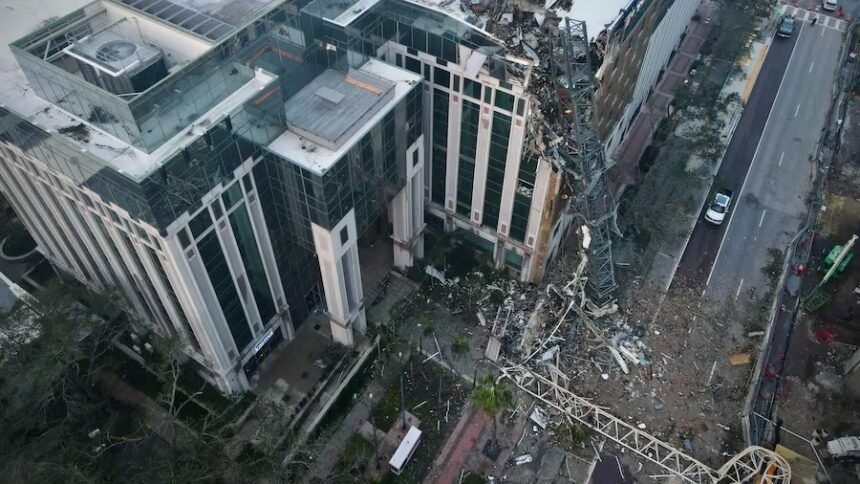In the wake of recent developments in St. Petersburg, Florida, two significant narratives have emerged: a call for greater responsibility in construction practices and a commitment to restore power swiftly by Duke Energy. Both highlight critical lessons about community safety and infrastructure management.
DeSantis Calls for Accountability in Construction
At a recent news conference, Florida Governor Ron DeSantis expressed his frustration regarding a crane developer in St. Petersburg, emphasizing that the company should have exercised more “common sense” in its operations. While specific details of the incident were not mentioned, the governor’s comments point to an underlying issue that affects many urban areas: the need for developers to consider the broader implications of their projects on community safety and well-being.
Construction sites are bustling environments, and while progress is crucial, it shouldn’t come at the expense of safety and foresight. DeSantis’s remarks serve as a reminder for developers to prioritize thorough risk assessments and community impact evaluations before moving forward with projects. It’s essential to ensure that the construction practices align with safety regulations and community standards to prevent future incidents.
Duke Energy’s Commitment to Swift Restoration
As discussions about safety and responsibility unfolded, Duke Energy made headlines of its own. During the same Friday news conference, the utility company pledged to restore power to affected areas “in days, not weeks.” This commitment is particularly significant in times of crisis when communities rely on timely restoration of services.
Restoring power swiftly after outages is crucial not only for residents’ comfort but also for their health and safety. Duke Energy’s assurance reflects a dedication to customer service and operational efficiency. It highlights the importance of having effective contingency plans in place to minimize downtime and restore normalcy as quickly as possible.
The Bigger Picture
The convergence of these two narratives—a call for accountability from the construction sector and a commitment to swift service recovery from utility providers—underscores a broader theme of community resilience. In times of trouble, it is essential for stakeholders, whether they are developers, utility companies, or government officials, to work together seamlessly to ensure the safety and well-being of all residents.
As the St. Petersburg community navigates these challenges, the emphasis on common sense in construction and the promise of quick power restoration serve as pivotal reminders of the responsibilities that come with development and service provision. It’s an opportunity for both sectors to reflect on best practices that can lead to safer, more resilient communities in the future.
Conclusion
In conclusion, the remarks from Governor DeSantis and the pledges from Duke Energy are significant steps towards fostering a safer and more reliable environment in St. Petersburg. As we move forward, it’s crucial for all parties involved to take these messages to heart, ensuring that common sense and efficiency guide their actions. Together, they can help build a stronger, more resilient community for all its residents.
Stay tuned for more updates as we follow this developing story!


Leave a Reply